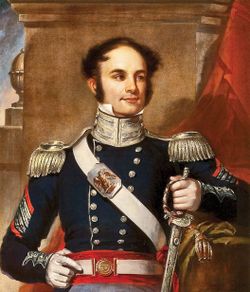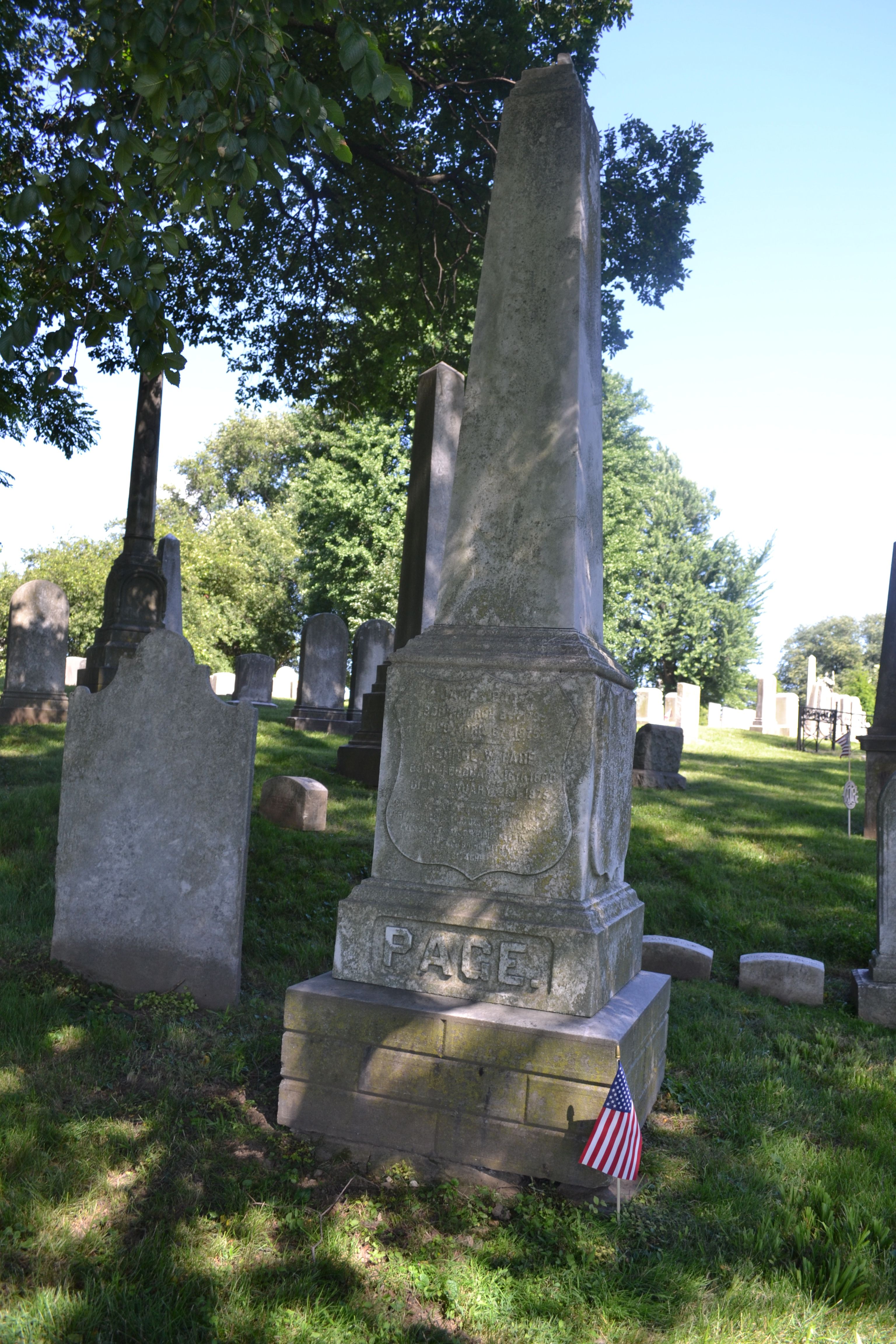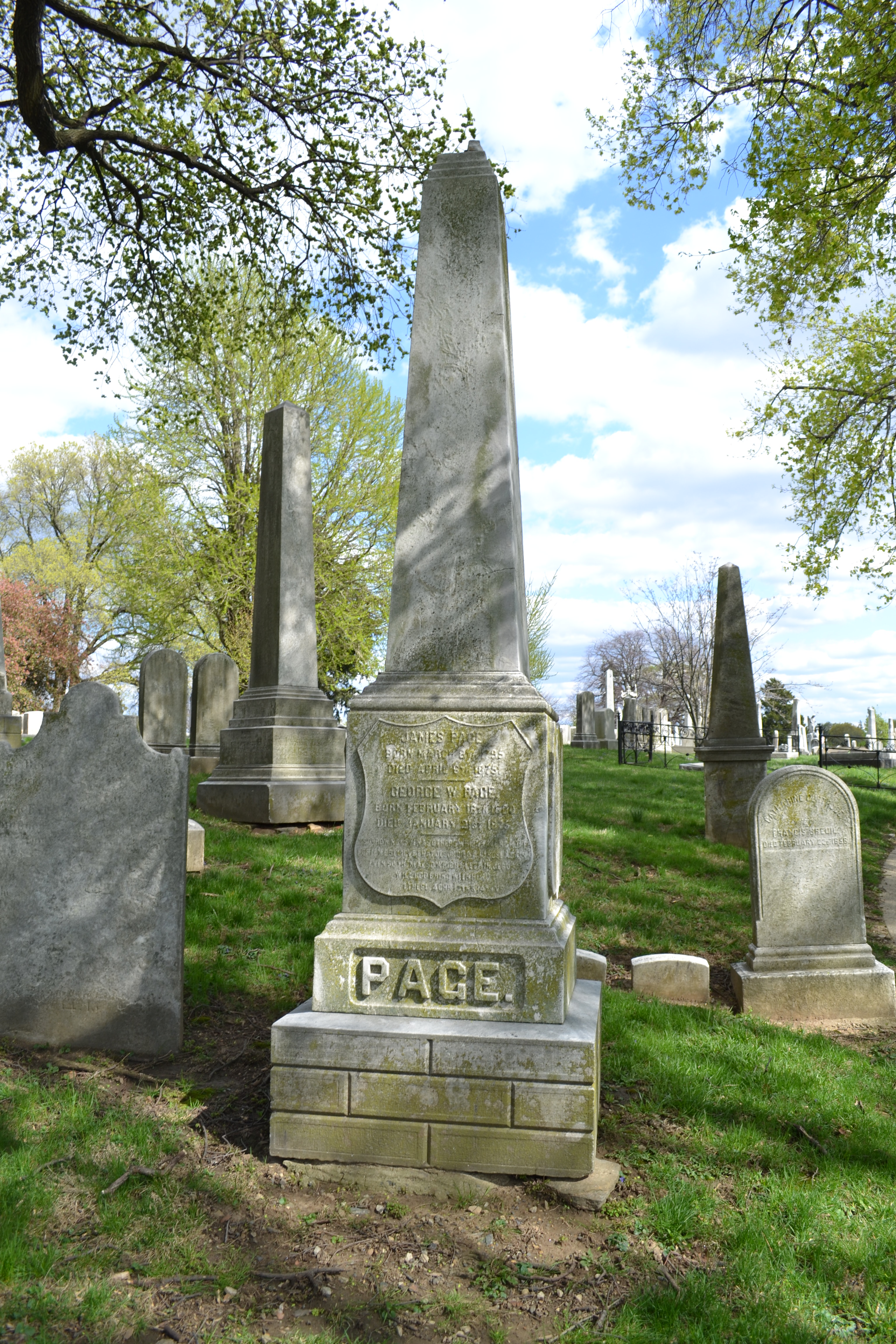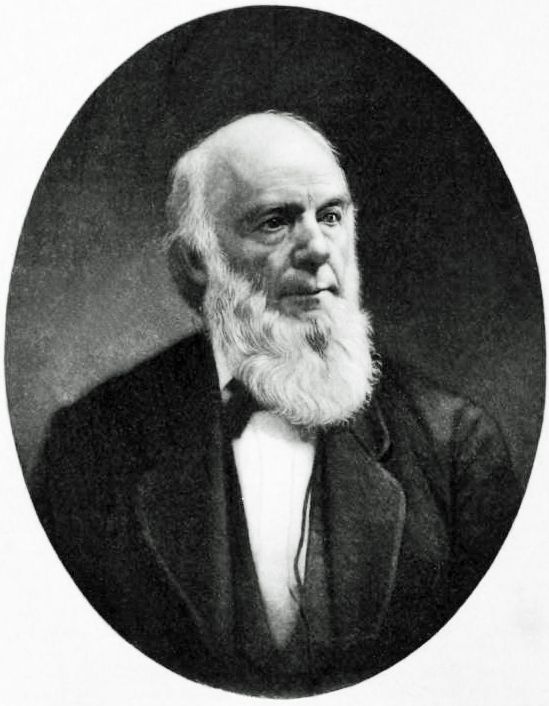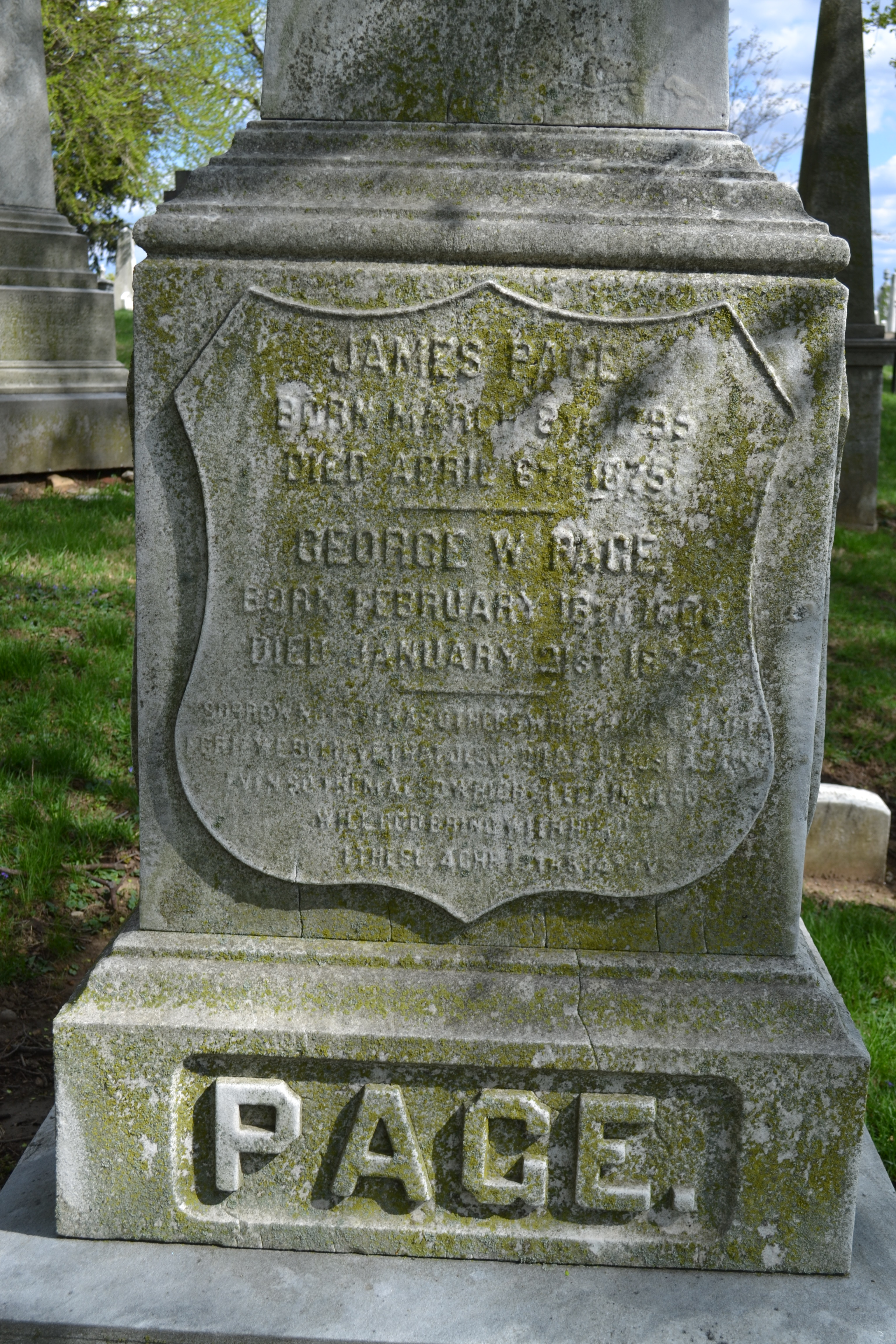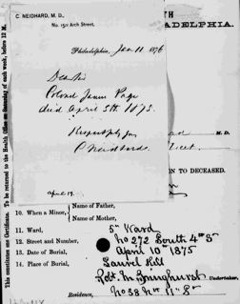1875-04-07; Paper: Philadelphia Inquirer
"DEATH OF COLONEL JAMES PAGE - SKETCH OF HIS LIFE
Colonel James Page died at his residence, No. 272 South Fourth street, at ten minutes past six o'clock, yesterday morning. He had been unconscious from eight A. M. of the day previous, when he bid his family good-bye, saying, "I am dying slowly; God bless you all. It is well with me."
Among those in attendance upon him in his final hours were Dr. C. Neidhard, his physician, and Rev. Wilbur F. Paddock, of St. Andrew's Protestant Episcopal Church. Colonel Page had been in impaired health for several years, and for the past few months had been rapidly declining. He was afflicted with a complication of disorders which bore heavily upon one of his advanced years, and his sufferings just previous to his death were great.
Colonel Page was well known and universally respected. He had been a public man all his life. He was a self-made man, who carried out and developed his own fortunes in life. Deceased was the son of Stephen and Mary Page, formerly of Virginia. He was born in this city, March 8, 1795, and had, therefore, reached the ripe old age of 80 years. His early boyhood days were passed as a farmer's boy with his father, receiving only a rudimentary log-cabin education, in Bucks county, Pa. Returning to Philadelphia, he became an office boy with the noted lawyer, Peter A. Browne, where by advice of his employer, he became a law student, and, at the age of 21 years, was admitted to practice, and met with success. From that time he became a public man: became interested in politics; soon became a party leader, and during his whole life was a consistent, unswerving Democrat. He occupied many prominent positions of honor and trust in the public service. He was president of the Common Council, a member of the Select Council, County Treasurer, Solicitor of the Board of Health and also of the County Commissioners, Democratic nominee for Mayor, president of the Democratic State Association and commissioner for the erection of new public buildings. During Andrew Jackson's administration, as also under President Van Buren, he was Postmaster of Philadelphia, and so well did he perform the duties that he was called upon by Postmaster-General Amos Kendall to preside over the New York Post Office for several months. Under President Polk he was collector of the port of Philadelphia, and, under Jackson, was Commissioner of Bankruptcy.
In reviewing his political career a few months ago Colonel Page said that the most difficult labor of his whole life was to preserve his honor and integrity amid the general clamoring for favors among politicians seeking their own advancement. He felt proud in saying, however, that he could unfold the book of his political life without a regret, and leave it for the world to scan. He was always interested in military matters. He was a private in the Old State Fencibles, organized in 1813, during the War of 1812-14 entered the United States service with the company in 1814, and served at Camp Bloomfield, Brandywine and other points. After the war, Colonel Page was elected captain of the fencibles, and so remained till 1861 - his organization being then, as it is now, famous. During his experience in command he did service in the Buckshot War and the riots of 1844, in Kensington and Southwark, where several of his men were killed. Here "Captain" Page was complimented for his bravery. In 1823 he was made major, and afterwards colonel, of the Second Pennsylvania Volunteer Infantry, the one-hundred-and-eighth of the line, and again of the First Regiment, Pennsylvania Volunteer Infantry, the one-hundred-and-eighth of the line. He afterwards became president of the State Fencibles Civil Organization, the corps having been converted into a volunteer organization. "The Old Guard," composed of survivors of the original Fencibles of Camp Dupont and their sons, was under command of Colonel Page up to the time of his death.
As a Mason Colonel Page was well and widely known. In 1822 he joined Rising Star Lodge. In 1825, he was elected to the Supreme Degree of R. A. M in Jerusalem H. R. A. C., and in 1848 was elected for the sixth time, W. M. of Lodge 126. He was made S. G. W. of the State in 1843, and in 1845 and 1847, R. W. G. M. He was for years chairman of the Committee on Appeals, and did good service in defining Masonic jurisprudence. He was chairman of the Trustees of the building fund for the new Masonic Temple on Broad street, and also for the old hall on Chestnut street.
As a volunteer fireman Colonel Page was noted or his interest. He was identified with the Hibernia Engine Company for over half a century. He joined the engineers of the company in 1817, and in 1821 was elected a member of the veteran organization. In the same year he was made president of the company, and was re-elected, at times, in 1842, 1844 and in 1857. He was in service as presiding officer longer, perhaps, than any other president, and was greatly beloved by the membership.
Throughout his long and active career Colonel Page enjoyed the highest reputation for integrity and for fidelity to every interest intrusted [sic] to his care. In his death Philadelphia loses one of her most honored citizens.
It is understood that Colonel Page, just before his death, expressed an earnest wish that his funeral might be strictly a private one, and that there should be no display of military or firemen on the occasion, and no bar or other meetings held in reference to his death."
1875-04-08; Paper: Philadelphia Inquirer
"PAGE - In this city, on the morning of the 6th inst., JAMES PAGE, in the 81st year if his age.
His friends and those of the family are invited to attend his funeral, from St. Andrew's Protestant Episcopal Church, Eighth street, above Spruce street, on Saturday, April 10th, at 12 M, Interment at Laurel Hill Cemetery."
1875-04-07; Paper: Philadelphia Inquirer
"DEATH OF COLONEL JAMES PAGE - SKETCH OF HIS LIFE
Colonel James Page died at his residence, No. 272 South Fourth street, at ten minutes past six o'clock, yesterday morning. He had been unconscious from eight A. M. of the day previous, when he bid his family good-bye, saying, "I am dying slowly; God bless you all. It is well with me."
Among those in attendance upon him in his final hours were Dr. C. Neidhard, his physician, and Rev. Wilbur F. Paddock, of St. Andrew's Protestant Episcopal Church. Colonel Page had been in impaired health for several years, and for the past few months had been rapidly declining. He was afflicted with a complication of disorders which bore heavily upon one of his advanced years, and his sufferings just previous to his death were great.
Colonel Page was well known and universally respected. He had been a public man all his life. He was a self-made man, who carried out and developed his own fortunes in life. Deceased was the son of Stephen and Mary Page, formerly of Virginia. He was born in this city, March 8, 1795, and had, therefore, reached the ripe old age of 80 years. His early boyhood days were passed as a farmer's boy with his father, receiving only a rudimentary log-cabin education, in Bucks county, Pa. Returning to Philadelphia, he became an office boy with the noted lawyer, Peter A. Browne, where by advice of his employer, he became a law student, and, at the age of 21 years, was admitted to practice, and met with success. From that time he became a public man: became interested in politics; soon became a party leader, and during his whole life was a consistent, unswerving Democrat. He occupied many prominent positions of honor and trust in the public service. He was president of the Common Council, a member of the Select Council, County Treasurer, Solicitor of the Board of Health and also of the County Commissioners, Democratic nominee for Mayor, president of the Democratic State Association and commissioner for the erection of new public buildings. During Andrew Jackson's administration, as also under President Van Buren, he was Postmaster of Philadelphia, and so well did he perform the duties that he was called upon by Postmaster-General Amos Kendall to preside over the New York Post Office for several months. Under President Polk he was collector of the port of Philadelphia, and, under Jackson, was Commissioner of Bankruptcy.
In reviewing his political career a few months ago Colonel Page said that the most difficult labor of his whole life was to preserve his honor and integrity amid the general clamoring for favors among politicians seeking their own advancement. He felt proud in saying, however, that he could unfold the book of his political life without a regret, and leave it for the world to scan. He was always interested in military matters. He was a private in the Old State Fencibles, organized in 1813, during the War of 1812-14 entered the United States service with the company in 1814, and served at Camp Bloomfield, Brandywine and other points. After the war, Colonel Page was elected captain of the fencibles, and so remained till 1861 - his organization being then, as it is now, famous. During his experience in command he did service in the Buckshot War and the riots of 1844, in Kensington and Southwark, where several of his men were killed. Here "Captain" Page was complimented for his bravery. In 1823 he was made major, and afterwards colonel, of the Second Pennsylvania Volunteer Infantry, the one-hundred-and-eighth of the line, and again of the First Regiment, Pennsylvania Volunteer Infantry, the one-hundred-and-eighth of the line. He afterwards became president of the State Fencibles Civil Organization, the corps having been converted into a volunteer organization. "The Old Guard," composed of survivors of the original Fencibles of Camp Dupont and their sons, was under command of Colonel Page up to the time of his death.
As a Mason Colonel Page was well and widely known. In 1822 he joined Rising Star Lodge. In 1825, he was elected to the Supreme Degree of R. A. M in Jerusalem H. R. A. C., and in 1848 was elected for the sixth time, W. M. of Lodge 126. He was made S. G. W. of the State in 1843, and in 1845 and 1847, R. W. G. M. He was for years chairman of the Committee on Appeals, and did good service in defining Masonic jurisprudence. He was chairman of the Trustees of the building fund for the new Masonic Temple on Broad street, and also for the old hall on Chestnut street.
As a volunteer fireman Colonel Page was noted or his interest. He was identified with the Hibernia Engine Company for over half a century. He joined the engineers of the company in 1817, and in 1821 was elected a member of the veteran organization. In the same year he was made president of the company, and was re-elected, at times, in 1842, 1844 and in 1857. He was in service as presiding officer longer, perhaps, than any other president, and was greatly beloved by the membership.
Throughout his long and active career Colonel Page enjoyed the highest reputation for integrity and for fidelity to every interest intrusted [sic] to his care. In his death Philadelphia loses one of her most honored citizens.
It is understood that Colonel Page, just before his death, expressed an earnest wish that his funeral might be strictly a private one, and that there should be no display of military or firemen on the occasion, and no bar or other meetings held in reference to his death."
1875-04-08; Paper: Philadelphia Inquirer
"PAGE - In this city, on the morning of the 6th inst., JAMES PAGE, in the 81st year if his age.
His friends and those of the family are invited to attend his funeral, from St. Andrew's Protestant Episcopal Church, Eighth street, above Spruce street, on Saturday, April 10th, at 12 M, Interment at Laurel Hill Cemetery."
Family Members
Advertisement
Advertisement
